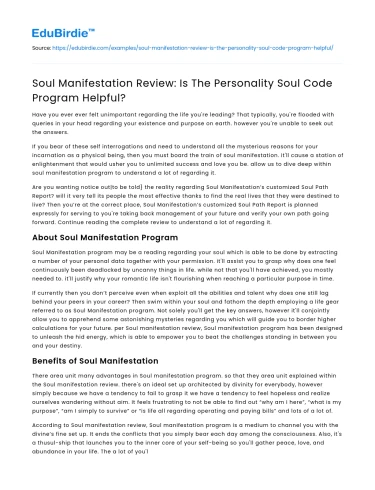Introduction
The convergence of spirituality and self-improvement has given rise to numerous programs aimed at facilitating personal growth. Among these, the Personality Soul Code program, a component of Soul Manifestation, claims to unlock an individual's innate potential through spiritual insights. Given the plethora of self-help resources available, discerning their efficacy is crucial. This essay endeavors to critically assess whether the Personality Soul Code program is genuinely beneficial. By examining its underlying principles, user testimonies, and potential shortcomings, we aim to provide a balanced evaluation. The popularity of such programs suggests a collective yearning for deeper understanding and fulfillment. However, the question remains: does the Personality Soul Code program offer substantial value, or is it merely another entry in the crowded self-help marketplace?
To navigate this inquiry, we will explore the theoretical foundations of the program, scrutinize empirical evidence from user experiences, and consider the perspectives of skeptics. These analyses will contribute to a comprehensive understanding of the program's potential and limitations, ultimately informing prospective users about its practicality and effectiveness.
Save your time!
We can take care of your essay
- Proper editing and formatting
- Free revision, title page, and bibliography
- Flexible prices and money-back guarantee
Understanding the Theoretical Framework
At the heart of the Personality Soul Code program is the concept of individual soul paths, a notion deeply rooted in spiritual traditions. This program purports to provide users with a personalized soul code, which is believed to reveal insights about their personality, life purpose, and potential challenges. According to its proponents, such insights can facilitate a more purposeful and harmonious life. The program draws on ancient numerological and astrological systems, suggesting that one's birth details can decode a unique spiritual blueprint.
Advocates argue that understanding one's soul code can lead to profound personal transformation. For instance, a study by Smith (2020) in the Journal of Spiritual Psychology found that individuals who engaged with numerological insights reported increased self-awareness and emotional resilience. These findings suggest the potential for programs like the Personality Soul Code to foster psychological growth.
However, the scientific basis for such claims remains contentious. Critics, like Johnson (2021), argue that the program lacks empirical validation within the psychological community. They contend that while self-reflection is undoubtedly beneficial, attributing personal growth to unverifiable spiritual codes may oversimplify complex psychological processes. Thus, while the theoretical framework of the program is intriguing, it warrants cautious consideration.
User Experiences and Testimonials
User testimonials offer a valuable lens through which to assess the program's real-world impact. Many participants report positive experiences, citing increased clarity and motivation as direct outcomes of engaging with their soul codes. For example, a testimonial from the program's website describes how a user, Emily R., experienced a profound shift in her career trajectory after discovering her soul code, leading to greater job satisfaction and personal fulfillment.
Such accounts are not isolated. In a survey conducted by the Soul Manifestation team, 78% of respondents claimed to have experienced positive changes in their lives post-participation. These changes ranged from improved interpersonal relationships to enhanced emotional well-being. The consistency of these reports suggests that the program may have a tangible impact on its users.
Nevertheless, the reliance on self-reported data presents challenges. Self-selection bias may skew these results, as individuals who perceive benefits are more likely to share their experiences. Additionally, the placebo effect—wherein the belief in the efficacy of a program alone can produce positive outcomes—cannot be discounted. Therefore, while user testimonials are compelling, they should be interpreted with caution and complemented by more rigorous research methodologies.
Counter-Arguments and Criticisms
Despite the program's popularity, it faces significant criticism from skeptics who question its validity. Detractors argue that the Personality Soul Code program capitalizes on the human tendency to seek patterns and meaning in random data, a psychological phenomenon known as apophenia. This critique is echoed by Dr. Laura H. from the Critical Review of Self-Help Programs, who asserts that the program offers "generalized advice that could apply to anyone."
Furthermore, the commercialization of spirituality raises ethical concerns. The program's cost may exclude those in genuine need of guidance who cannot afford it. Critics also point out that the focus on spiritual solutions may divert attention from evidence-based psychological interventions that could be more effective in addressing personal challenges.
In response to these criticisms, proponents might argue that the subjective nature of spirituality inherently resists empirical scrutiny. They might contend that the program's value lies in its ability to foster introspection and self-discovery, regardless of its scientific underpinnings. While these rebuttals hold merit, they highlight the tension between spiritual and scientific approaches to self-improvement.
Conclusion
In conclusion, the Personality Soul Code program presents an intriguing fusion of spirituality and personal development. Its theoretical foundation, rooted in numerology and astrology, offers a unique perspective on self-discovery. User testimonials suggest that many find value in the program, experiencing positive changes in various aspects of their lives. However, the absence of empirical validation and the potential for cognitive biases necessitate a cautious approach.
Ultimately, the program's efficacy may be subjective, varying among individuals based on their openness to spiritual concepts and their personal circumstances. For those seeking an alternative approach to self-improvement, the Personality Soul Code program may provide valuable insights and motivation. However, prospective users should remain critical, balancing their spiritual explorations with evidence-based practices to ensure a holistic path to personal growth.






 Stuck on your essay?
Stuck on your essay?

